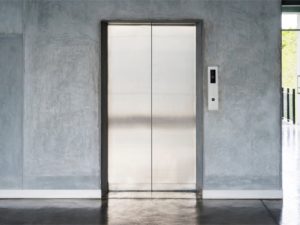Were You Injured When an Elevator Closed on You?
Posted August 9th, 2018 by Anthony Carbone, PC.
Categories: Premises Liability.
 Jersey City is not only a transportation hub but also home to a number of skyscrapers. The Goldman Sachs tower, located at 30 Hudson Street boasts 42 floors. Meanwhile, you have your choice of 36 elevators to move from floor to floor. So, what happens if one of them closes on you as you are entering or exiting?
Jersey City is not only a transportation hub but also home to a number of skyscrapers. The Goldman Sachs tower, located at 30 Hudson Street boasts 42 floors. Meanwhile, you have your choice of 36 elevators to move from floor to floor. So, what happens if one of them closes on you as you are entering or exiting?
Meanwhile, it’s not just high rises or the Jersey City Transportation Center that offer elevators to patrons who need to climb flights in a building. Elevators are in the hospital, as well as many smaller structures. However, like any machine – there’s a chance they could malfunction.
If you’re on an elevator, you most likely have some reasonable expectations. For one, you expect the elevator to close at a certain rate – and not crush your body. Of course, you could be concerned that extreme stops and jolts might hurt your neck and back. Free falling elevators can cause serious injuries. There’s also the risk of electrical injuries in a malfunctioning elevator.
In a worst case scenario, you may be distracted and think you are walking into the elevator. Unfortunately, the doors may open without the presence of the enclosed structure. More than one person has cascaded down an elevator shaft in this unfortunate set of circumstances.
According to a consumer advocacy group, there are over 900,000 elevators throughout the country. Estimates put the number of annual average fatal accidents involving elevators at 27. Add to that the number of injuries – and the toll goes up.
The New Jersey Supreme Court recently decided a case involving an elevator accident. When the plaintiff was injured in an elevator accident, she sued those she found responsible for maintaining and repairing the elevator. The results of the case might interest you.
Supreme Court Ruling on Elevator Case
As you most likely know, the New Jersey Supreme Court is the highest appeals court in New Jersey. McDaid v. Aztec West Condominium Association is a published legal opinion and considered precedential law.
First, some brief facts of the case. The plaintiff, Maureen McDaid was injured when she was exiting an elevator and the doors kept opening and closing on her. She subsequently brought a negligence claim against Aztec West Condominium Association, Preferred Management, Inc., the Association’s management company, and Bergen Hydraulic Elevator, the elevator-maintenance provider.
Four days after McDaid’s accident, a municipal code official inspected the elevator and indicated that the electric eye was in need of repair. The electric eye is one of two safety features designed to protect passengers from injuries related to closing doors. The other is a mechanical safety edge, which should pull back when it makes contact with any type of object.
In support of her allegations that the accident was caused because the elevator malfunctioned, McQuaid’s attorney supplied an expert report – stating the incident occurred because of the electric eye was damaged. Meanwhile, the Condo Association and Management Company’s expert disagreed. Their expert report concluded that “McDaid’s “failure to clear the path” of the closing elevator door “in a timely manner” was the proximate cause of her injuries. Bergen Hydraulic’s expert agreed – stating that the elevator was maintained properly.
What happened next might come as a surprise to you. Both the trial court and the New Jersey Appellate Division agreed that the defendants should be let out of the case on what’s known as a summary judgment. The reason? The plaintiff “failed ‘to bring forth affirmative evidence that tends to exclude other causes’ for the malfunctioning of the elevator.”
Case Referred Back to Trial Court
Upon review by the New Jersey Supreme Court, the case was referred back to the trial court. The ruling was based on the legal principle of res ipsa locquitar – literally translated to “the thing speaks for itself.”
In the first place, it’s reasonable to expect the defendants to know about the dangerous conditions associated with the malfunctioning elevator eye – and expect them to take care of it. Additionally, there was no indication that the plaintiff was in anyway responsible for the accident. The Supreme Court concluded that “To invoke the res ipsa inference, a plaintiff does not have to exclude alternative possible causes of the accident, “provided that the circumstances establish ‘that it is more probable than not that the defendant’s negligence was a proximate cause of the mishap.’”
Why was the case remanded? The New Jersey Supreme Court does not determine damages. They solely review disputes concerning interpretation of the law.
Contact Us
Whether you were injured in an elevator accident in Jersey City or elsewhere in New Jersey, the Law Offices of Anthony Carbone can assist you with your claim. We would be more than happy to discuss the circumstances that led to your injuries. Give us a call today!


